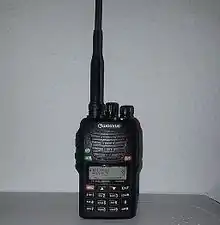List of amateur radio transceivers
This is a list of amateur radio transceivers.
AnyTone
| Make | Category | Model |
|---|---|---|
| AnyTone | Handheld | AT-3318UV |
| AnyTone | Handheld | AT-3318UV-A |
| AnyTone | Handheld | AT-3318UV-A v3 |
| AnyTone | Handheld | AT-3318UV-D |
| AnyTone | Handheld | AT-3318UV-E |
| AnyTone | Handheld | AT-518UV |
| AnyTone | Handheld | AT-3208UV |
| AnyTone | Handheld | AT-3140UV |
| AnyTone | Handheld | AT-D858 |
| AnyTone | Handheld | AT-D868UV |
| AnyTone | Handheld | AT-D878UV |
| AnyTone | Handheld | AT-D578UV |
| AnyTone | Mobile | AT-6666 |
| Stryker | Mobile | SR-94HPC |
Alinco
.jpg.webp)
(D)PMR
Marine
DMR
NXDN
Desk
|
LandMobile
Handheld
|
BaoFeng
RX and TX below and elsewhere are ham radio jargon for receive and transmit.
| Model | Category | Frequency ranges (MHz) |
|---|---|---|
| BF-F8HP[6] | Handheld | 136–174 400–520 65–108 (RX only) |
| UV-5X3[6] | Handheld | 130–179 220–225 400–520 65–108 (RX only) |
| GMRS-V1[6] | Handheld | 15 GMRS two-way channels 8 GMRS repeater channels 130–179 (RX only) 400–520 (RX only) 65–108 (RX only) |
| UV-82HP[6] | Handheld | 136–174 400–520 65–108 (RX only) |
| UV-82C[6] | Handheld | 136–174 400–520 65–108 (RX only) |
| UV-5R[6] | Handheld | 136–174 400–520 65–108 (RX only) |
| BF-F8+[6] | Handheld | 136–174 400–520 65–108 (RX only) |
| UV-82[6] | Handheld | 136–174 400–520 65–108 (RX only) |
| BF-888S[6] | Handheld | 400–480 65–108 (RX only) |
| UV-25X2[6] | Portable | 130–179 400–520 65–108 (RX only) |
| UV-25X4[6] | Portable | 130–179 220–260 (US, Asia) 360–390 (Eurasia) 400–520 65–108 (RX only) |
| UV-50X2[6] | Portable | 130–179 400–520 65–108 (RX only) |
| UV-50X3[6] | Portable | 136–174 222–225 400–480 500–1719 (RX only) 65–108 (RX only) 108–135 (RX only) 174–250 (RX only) 300–399 (RX only) 481–520 (RX only) |
UV-5R
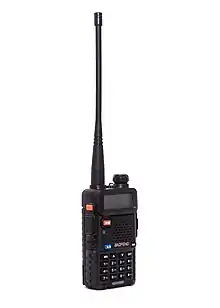
The Baofeng UV-5R is a discontinued hand-held radio that has been marketed illegally in the United States[7] and was produced since 2012.[8] It has been used in a number of projects involving radios.[9][10] It is described as a popular inexpensive model. [7]
Features
It is designed to transmit on the 2 meter band between 144 and 148 MHz and on the 70cm band between 430 and 450 MHz. Features include CTCSS and duplex operation for use with local repeaters, dual watch and dual reception, an LED flashlight, voice prompts in either English or Chinese and programmable LED lighting for the LCD display.
Illegal marketing and distribution in the United States
The FCC cited the Houston, Texas based importer Amcrest Industries which owns and operates Baofengradio US for illegally marketing UV-5R, "capable of operating outside the scope of its equipment authorization,” the FCC Citation said, which is outside of its Part 90 authorization granted. The FCC asserts Amcrest marketed "UV-5R-series FM hand-held radios capable of transmitting on “restricted frequencies." "Marketing a device that is "capable of operating outside the scope of its equipment authorization,” is not allowed.[7]
CRT France
Communication Radio Telecommunication France is a company producing amateur radio transceivers.[11]
| Model | Category | Frequency ranges (MHz) |
|---|---|---|
| FP 00[12] | Handheld | RX/TX : 144-146 Mhz / 430-440 Mhz |
| 1 FP[13] | Handheld | RX/TX : 144-146 Mhz / 430-440 Mhz |
| 2 FP[14] | Handheld | RX/TX : 144-146 Mhz / 430-440 Mhz |
| P2N[15] | Handheld | RX/TX : 144-146 Mhz / 430-440 Mhz |
| 4 CF V2[16] | Handheld | RX/TX : 144-146 Mhz / 430-440 Mhz |
Elecraft
| Model | Frequency Range | Power (W) | Modes | AGC | RX(mA) | TX(mA) | Filter Bandwidth(Hz) |
|---|---|---|---|---|---|---|---|
| K1[17] | 2- or 4-Band module (HF) | 0,1-7W | CW | yes | 55 | 200–1000 | 200–800 |
| KX1[18] | 40/20M + opt. 30/80M | 3-5W | CW, + SSB/AM RX | yes | 50 | 300–600 | 200–2200 |
| K2[19] | 80-10M + opt. 160/60M | 0,1-15W + opt. 100W | CW, SSB, data | yes | 150 | 400–1500 | 200–2800 |
| KX2 | 80-10M | 12W + opt. 100W | SSB, CW, DATA, AM, FM | yes | 135 | 400–2000 | 50-4000 |
| KX3[20] | 160-6M + opt. 2 or 4M | 10W + opt. 100W | SSB, CW, DATA, AM, FM | yes | 150 | 400–2000 | 50-4000 |
Icom


Handheld
- ID-51[21]
- ID-31
- IC-70 (ANALOG)
- IC-86 (ANALOG)
Mobile
- ID-5100
- ID-4100
- IC-2730 (ANALOG)
- IC-2300 (ANALOG)
- IC-2200h
VHF/UHF/SHF All Mode
- IC-9700[25]
Kenwood
Among the product lines are the "TS" series of HF transceivers which cover the HF ("high frequency") bands, from 1.8 to 50 MHz. These transceivers include the TS-820S, the TS-590S, the TS-850S, the TS-430S.
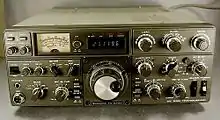
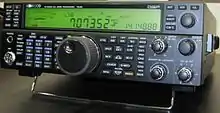
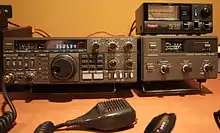
Other series include the 100, 500, and the 2000 series. Kenwood also offers a "B" model, which is a transceiver without display or controls and is completely controlled by a remote computer or a separate control unit.
- Radios with built-in digital data modes and modems (for APRS)
TS-2000
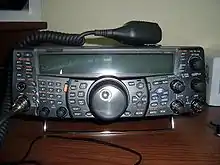
The Kenwood TS-2000 is an amateur radio transceiver manufactured by the Kenwood Corporation.[26][27][28] Introduced in the year 2000, the radio was known for its "all-in-one" functionality. It can transmit on all amateur radio bands between 160 meters and 70 centimeters, with the exception of the 1.25 meters and 33 centimeters bands, and the "X" model also has built-in 23 centimeters band capability option. Kenwood discontinued production of the TS-2000 in September, 2018. [29]
Variations
- TS-2000, the standard base station model, with the regional versions
- K-Type for the Americas;
- E-Type for Europe;
- E2-Type for Spain;
- TS-2000X, same as the above with the addition 1.2 GHz (23 cm band) capability;
- TS-B2000, a sleek "black box" unit requiring a computer or an optional mobile control panel for control
- TS-2000LE, limited production TS-2000 with a black finish to celebrate Kenwood's 60th Anniversary
Features
The TS-2000 was marketed as a feature-rich transceiver. As an "all-band" transceiver, the TS-2000 offers a maximum power output of 100 watts on the HF, 6 meters, and 2 meters bands, 50 watts on 70 centimeters, and, with the TS-2000X or the optional UT-20, 10 watts on the 1.2 GHz or 23 centimeters band. The (American version) radio's main receiver covers 30 kHz through 60 MHz, 142 MHz through 152 MHz, and 420 through 450 MHz (plus 1240 through 1300 MHz with the "X" model). The sub-receiver tunes between 118 and 174 MHz, and from 220 to 512 MHz (VFO ranges).[30]
The radio's main receiver uses DSP at the IF level, so a very flexible selection of bandwidths are available without the purchase of mechanical filters, as was necessary on past radios.
It features backlit keys, a built-in TNC for receiving DX Packet Cluster information, and the Sky Command II+ system (found on the K-Model), which allows for remote control of the transceiver using Kenwood's TH-D7A handheld or TM-D700A mobile radio.
Firmware
Kenwood provides a firmware Update,[31] Memory Control Program MCP-2000,[32] and Radio Control Program ARCP-2000.[33]
External links
- TS-2000 at KenwoodUSA.com
- Software: http://www.kenwood.com/i/products/info/amateur/ts2000_history_e.html
TS-820S
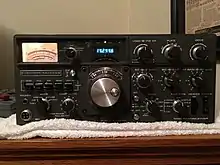
The Kenwood TS-820S is a model of amateur radio transceiver produced primarily by the Kenwood Corporation from the late 1970s into the 1980s; some were produced by Trio Electronics before Kenwood's 1986 name change). The transceiver's predecessor was the TS-520, which began production a year earlier. The TS-820S was the second of three hybrid (including vacuum tubes and semiconductors) models produced by Kenwood during the 1970s and 1980s,[34] and was noted for its quality. Its functionality and new hybrid technology made it one of the most popular transceivers marketed to amateurs in the late 1970s and early 1980s. The TS-820S has a built-in power supply, so it can be plugged directly into a 120 V wall outlet.
Variants
The TS-820 did not have an LED frequency counter, but was otherwise identical to the 820S.[35] The TS-820S was the most sophisticated (and common) variant.[35] The TS-820X, unavailable in the United States, was primarily produced in Japan.
Functions
The transceiver can transmit and receive on the HF 10-, 15-, 20-, 40-, 80- and 160-meter bands,[36] and can receive WWV and WWVH on 15 MHz. It can use SSB, FSK and CW on all bands.[36] The TS-820S' power consumption is 57 watts (with heaters on) when receiving and 292 watts when transmitting. The transceiver's peak envelope power output on SSB and CW is about 100 watts, and about 60 watts on FSK. Its tubes are tuned manually, using the transceiver's drive, plate and load controls.
General specifications
- Frequency range: 1.8–2.0 MHz, 3.5–4.0 MHz, 7.0–7.3 MHz, 14.0–14.35 MHz, 21.0–21.45 MHz, 28.0–28.5 MHz, 28.5–29.0 MHz, 29.0–29.5 MHz, 29.5–29.7 MHz; receives WWV and WWVH on 15 MHz
- Power supply: 120/220 VAC
- Modes (receive and transmit): LSB, USB, FSK, CW
- Power consumption: 57 watts (receive, heaters on); 292 watts (transmit)
- Antenna impedance: 50–75 ohms
- Antenna Connector: SO-239
- Weight: 35.2 pounds (16.0 kg)[36]
- Dimensions: Width 333 millimetres (13.1 in), height 153 millimetres (6.0 in), depth 335 millimetres (13.2 in)[36]
- Features: Digital frequency counter, VOX, noise blanker, receiver incremental tuning (RIT), IF shift, RF attenuation[37]
Receiver and transmitter specifications
- Stability: Within 100 Hz in 30 minutes after the radio has warmed up, or up to 1 kHz in one hour after one minute of warm-up.
- Audio-frequency response: 400–2600 Hz within 6dB
- Bandwidth: 2.4 kHz on SSB, 500 Hz on CW [36]
Midland
Yaesu

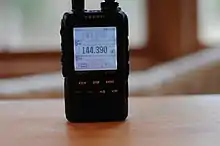
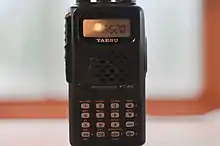
Desk transceivers (HF)
|
Desk transceivers (VHF/UHF)
|
Handheld transceivers (VHF/UHF)
|
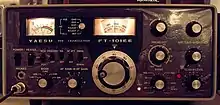 Yaesu FT-101EE .jpg.webp) Yaesu FT-7B (bottom) 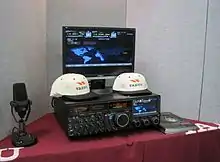 FT-DX9000D
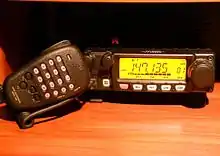 Yaesu FT-2800M 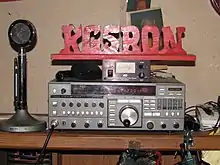 Yaesu FT-736R 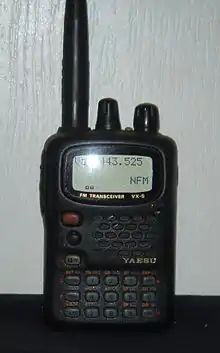 Yaesu VX-5R 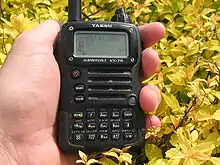 Yaesu VX-7R |
FT-221
The FT-221 is a modular VHF 2M all mode (SSB, AM, CW and FM) amateur radio transceiver, produced during the 1970s.
Technical description
Other model variants
The FT221R is a model with repeater shift. The FT221RD also has a digital display.
FT-857
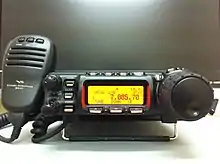
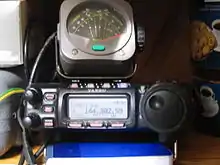
The Yaesu FT-857 is one of the smallest MF/HF/VHF/UHF multimode general-coverage amateur radio transceivers.[45] The set is built by the Japanese Vertex Standard Corporation and is sold under the Yaesu brand. [46] The FT-857 is developed on the FT-897 and MARK-V FT-1000MP transceivers.[45]
Technical specifications
- RX Freq coverage: 100 kHz-56 MHz, 118 MHz-164 MHz, 420 MHz-470 MHz
- TX Freq coverage: 160 – 6 Meters, 2 Meters, 70 Centimeters
- Emission: CW, SSB, AM, FM, Digital mode
- Power output: 100W (SSB,CW,FM), 25W (AM, carrier) @ 13.8V[46]
QRP Transceivers
These are low power transceivers primarily used by Amateur Radio Operators for QRP (low power) Operation. They are available as commercial products, built from kits or homebrewed from published plans.
| Model | Type | Band or Frequency Range | Maximum Power (W) | Modes | In Production |
|---|---|---|---|---|---|
| UBitx (v6)[47] | Kit (can also be homebrewed) | 3-30 MHz (HF) | 5-10 | CW / SSB / Wide band RX | Yes |
| BITX40 | Kit | 40M | 7 | SSB | No |
| QCX+[48] | Kit | Built for a single band
80M / 60M / 40M / 30M / 20M / 17M |
5 | CW | Yes |
| 2N2/40+ | Homebrew | 40M (mods for other bands) | 2 | CW | N/A |
| Small Wonder Labs SW+ | Kit | Single band
80M / 40M / 20M |
2 | CW | No |
| ME Series | Kit | Single band
80M / 40M / 30M / 20M |
2 | CW | Yes |
| Nouveau 75A | Kit | 80M | 5 (Carrier) / 20 PEP | AM | Yes |
| Splinter II | Kit | 40M | 0.5 | CW | Yes |
| OHR 100A | Kit | 80M / 40M / 30M / 20M / 15M | 5
(4 - 4.5 on 15M) |
CW | Yes |
| QRPGuys DSB Digital Transceiver II | Kit | 40M / 30M / 20M | 1 - 2.5 | Digital Modes
(FT8 / Others) |
Yes |
| Elecraft KX3 | Kit or assembled | 160 - 6 meter ham bands / Wide band RX | 0.1 - 10 | CW / SSB / AM / FM / Digital Modes | Yes |
| Yaesu FT-818 | Commercial | HF/VHF/UHF | 6 | All-Mode | Yes |
| Icom IC-705 | Commercial | HF/VHF/UHF | 10 | All-Mode | Yes |
References
- "ALINCO". www.alinco.com. Retrieved 2019-11-19.
- "DJ-A11/41" (PDF).
- "DJ-A35" (PDF).
- "DJ-A36" (PDF).
- "DJ-A446" (PDF).
- "BaoFeng Compare chart" (PDF).
- "FCC Cites Baofeng Importer for Illegally Marketing Unauthorized RF Devices". www.arrl.org. ARRL. Retrieved 18 October 2019.
- "UV-5R – BaoFeng". baofengtech.com. Retrieved 2019-11-19.
- Maloney, Dan (December 14, 2016). "Measuring Spurious Emissions Of Cheap Handheld Transceivers". Hackaday.
- Lewin, Day (May 20, 2019). "Using A Cheap Handheld Radio As A Morse Transceiver".
- "About us – CRT FRANCE". www.crtfrance.com. Retrieved 2019-11-19.
- "CRT FP 00". CRT FRANCE. Retrieved 2019-11-20.
- "CRT 1 FP HAM". CRT FRANCE. Retrieved 2019-11-20.
- "CRT 2 FP HAM". CRT FRANCE. Retrieved 2019-11-20.
- "TALKY WALKY CRT P2N". CRT FRANCE. Retrieved 2019-11-20.
- "Handheld CRT 4CF 144/430Mhz + Transponder + Air Band AM 8.33khz". www.passion-radio.com. Retrieved 2020-05-01.
- "K1 Homepage". Archived from the original on 2010-03-16. Retrieved 2019-11-30.
- "KX1 Homepage". Archived from the original on 2018-09-27. Retrieved 2019-11-30.
- K2 Homepage: http://www.elecraft.com/k2_page.htm Archived 2010-03-05 at the Wayback Machine
- "KX3 Homepage". Archived from the original on 2016-07-19. Retrieved 2019-11-30.
- "Amateur | Products | Icom Inc". www.icom.co.jp. Retrieved 2019-11-19.
- Wampler, Bruce (April 2016). "Icom IC-7300 – A look under the hood" (PDF).
- "IC-703 Plus HF/50MHz All Mode Transceiver – Features – Icom America". www.icomamerica.com. Retrieved 2019-11-30.
- "IC-705 : Mobile Amateur Radio (Ham) - Icom UK". icomuk.co.uk. Retrieved 2021-01-30.
- "IC-9700 VHF/UHF All Mode Transceiver – Icom America". www.icomamerica.com. Retrieved 2020-04-26.
- Raul A. Santos; Arthur Edwards Block (22 June 2012). Embedded Systems and Wireless Technology: Theory and Practical Applications. CRC Press. pp. 388–. ISBN 978-1-57808-803-4.
- American Radio Relay League (2002). The ARRL Handbook for Radio Communications 2003. American Radio Relay League. ISBN 978-0-87259-192-9.
- "ARRL Laboratory Expanded Test-Result Report Kenwood TS-2000" (PDF). American Radio Relay League, Inc. ARRL. Retrieved 22 December 2017.
- "TS-2000シリーズ(生産完了商品)|アマチュア無線|無線通信|製品情報|ケンウッド". www.kenwood.com. Retrieved 2018-12-09.
- "Kenwood TS-2000 Specifications". www.rffun.com.
- Kenwood.com
- "TS-2000(X)/B2000 Firmware update information". www.kenwood.com.
- "KENWOOD Radio Control Program ARCP-2000". www.kenwood.com.
- Benedict, James (2016). "Vintage Hybrid Receivers". eHam.
- Kenwood Corporation (1970–80). Kenwood TS-820S Instruction Maual. Kenwood Corporation. p. 2.
- Kenwood Corporation (1970–80). Kenwood TS-820S Instruction Manual. Kenwood Corporation. p. 3.
- "RigPix Database – Kenwood/Trio – TS-820S". www.rigpix.com. Retrieved 2018-05-20.
- "About Wouxun Company". www.wouxun.com. Retrieved 2019-11-19.
- By (2019-03-15). "The $50 Ham: Entry-Level Transceivers For Technicians". Hackaday. Retrieved 2019-11-19.
- "Dual Band Two Way Radio KG-UV6D". www.wouxun.com. Retrieved 2019-11-19.
- By (2019-09-03). "Ham Radio Gets Embedded RTL-SDR". Hackaday. Retrieved 2019-11-19.
- "Yaesu FT-221R Specifications". www.qsl.net. Retrieved 2019-11-30.
- "Yaesu FT-221 Instruction manual" (PDF). textfiles.com.
- Yaesu FT-857
- Yaesu FT-857 Operating Manual
- "HF SIGNALS – The Home of BITX transceivers". Retrieved 2020-07-17.
- "QRP Labs Kits". qrp-labs.com. Retrieved 2020-07-17.
